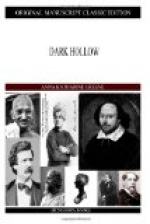At last, when the final ray had departed and darkness reigned supreme, there came a low knock on the door. Then a troubled cry:
“Oh, judge, are you here?”
“I am here.”
“Alone and so dark?”
“I am always alone, and it is always dark. Is there any one with you?”
“No, sir. Shall I make a light?”
“No light. Is the door quite shut?”
“No, judge.”
“Shut it.”
There came the sound of a hand fumbling over the panels, then a quick snap.
“It is shut,” she said.
“Don’t come any nearer; it is not necessary.” A pause, then the quick question ringing hollow from the darkness, “Why have your doubts returned? Why are you no longer the woman you were when not an hour ago and in this very spot you cried, ’I will be Oliver’s advocate!’” Then, as no answer came,—as minutes passed, and still no answer came, he spoke again and added: “I know that you are ill and exhausted—broken between duty and sympathy; but you must answer me, Mrs. Scoville. My affairs won’t wait. I must know the truth and all the truth before this day is over.”
“You shall.” Her voice sounded hollow too and oh, how weary! “You allowed the document you showed me to remain a little too long before my eyes. That last page—need I say it?”
“Say it.”
“Shows—shows changes, Judge Ostrander. Some words have been erased and new ones written in. They are not many, but—”
“I understand. I do not blame you, Deborah.” The words came after a pause and very softly, almost as softly as her own but which had sounded its low knell of doom through the darkness. “Too many stumbling-blocks in your way, Deborah, too much to combat. The most trusting heart must give way under such a strain. That page was tampered with. I tampered with it myself. I am not expert at forgery. I had better have left it, as he wrote it.” Then after another silence, he added, with a certain vehemence: “We will struggle no longer, either you or I. The boy must come home. Prepare Reuther, or, if you think best, provide a place for her where she will be safe from the storm which bids fair to wreck us here. No, don’t speak; just ask Mr. Black to return, will you?”
“Judge—”
“I understand. Mr. Black, Deborah.”
Slowly she moved away and began to grope for the door. As her hand fell on the knob she thought she heard a sob in those impenetrable depths behind her; but when she listened again, all was still; still as if merciful death and not weary life gave its significance to the surrounding gloom.
Shuddering, she turned the knob and paused again for rebuff or command. Neither came; and, realising that having spoken once the judge would not speak again, she slipped softly away, and the door swung to after her.
When Mr. Black re-entered the study, it was to find the room lighted and the judge bent over the table, writing.




